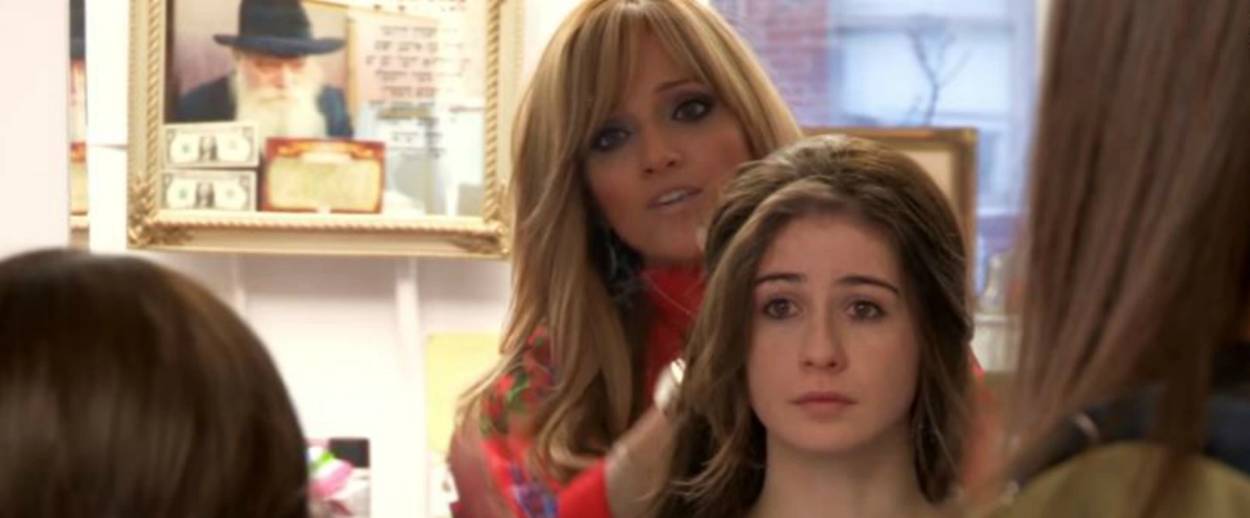‘Arranged’ Explores the Difficult Choice of Wearing a Sheitel
As an Orthodox couple prepares for marriage, the bride-to-be deals with an internal struggle: wear a wig or feel like a ‘black sheep’




The first episode of the second season of Arranged, the FYI network’s reality show about arranged marriages across a number of cultures, depicts, among others, the relationship between Vicki and Ben, an Orthodox Jewish couple. In preparation for their nuptials, the couples faces a number of internal obstacles common to many Orthodox couples, such as not being able to touch each other before marriage, the need for privacy, and the bride-to-be’s hesitancy to cover her hair, which becomes a major plot point.
In one scene, Vicki visits a sheitelmacher with a friend. Before entering, she says she’d feel like a “black sheep” if she didn’t wear a sheitel, or wig, once she’s married. Vicki’s emotion is palpable.
In another scene, Vicki describes her hair as a “really big part of her identity” claiming that she will not feel like herself if she wore a wig, a mitzvah. “I would miss my hair,” she says. Ben, meanwhile, says that he believes it’s her decision, but adds that he’d be “disappointed.”
Vicki’s initial disinclination reminded me of a Nathan Englander story, “The Wig,” wherein the protagonist, a sheitelmacher, thinks: “[T]hey are trapped in their modesty, and want to feel, even as an illusion, the simple pleasure of wind in their hair.”
That line—”the simple pleasure of wind in their hair”—will, on a spring day, reverberate in my mind as I walk from coffeeshop to office. The commas that offset the phrase “and want to feel” emphasize how hair, as seen in Vicki’s struggles, entangles with our identities, our selves. (The Medusa, remember, is killed by severing its head, cutting its hair, its potency).
The word Vicki may be looking for when describing hair-covering is the Hebrew word oth, both a sign and promise of significance, like a rainbow. More than any other body part, hair is the ultimate signifier. It denotes age, class, status, even desirability (watch any shampoo commercial). In Arranged, if Vicki chooses to conceal her hair with a wig, she has thus decided to forgo an element of her identity, essentially castrating it from her self, replacing it with something else, something foreign. If she decides not to wear a wig, then Vicki will not fit in with her Orthodox community.
Still, any climatic resolution is lost on those of us who have played “hair or sheitel.” We already know that Vicki will choose to cover her hair because in her interviews, which are articulated in the present-tense but are obviously done in the future, she wears a wig. This production flaw undermines the authenticity of Vicki’s struggle.
The show poses other ironies, furthers other illusions. Ben berates Vicki for using social media, telling her, “if the whole point is for it to be documented all the time, it just feels so unnatural, like sort of fake.” One may wonder if this is a meta-reference to his own participation in a reality television show, or even an unconscious allusion to Vicki’s hair struggle. In a future episode, Ben claims that Orthodox Judaism promotes “liv[ing] modestly, and social media is the exact opposite of that.” What about appearing on a reality television show?
As Arranged attempts to portray, choosing to cover one’s hair is a personal choice, linked intimately with identity and fraught with politics. What we conceal and how we conceal reveals who we are. Our hair, our selves. And though the show has it’s flaws, it’s good to see an Orthodox woman’s relationship with her hair, and the implications of covering it due to marriage, being discussed in the mainstream.
Brachah Goykadosh is an assistant corporation counsel at the NYC Law Department and an adjunct lecturer at CUNY, where she received the Charles Hirsch Faculty & Staff Award in Fiction. Her work has previously appeared in The New York Times.